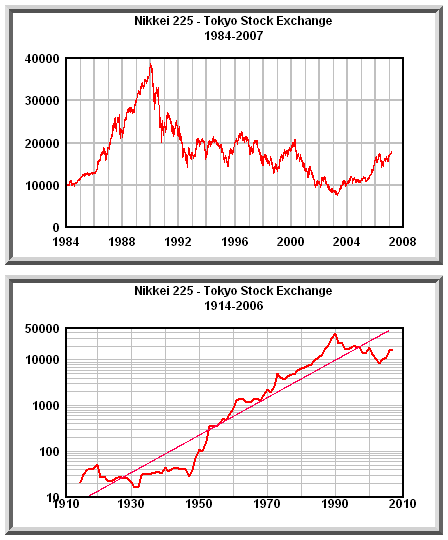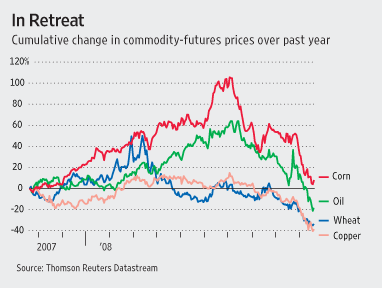
Dynamics

|
Generational Dynamics |
| Forecasting America's Destiny ... and the World's | |
| HOME WEB LOG COUNTRY WIKI COMMENT FORUM DOWNLOADS ABOUT | |
The questions were penetrating, but NYU economist Mark Gertler evaded them all.
 |
This interview with New York University professor of economics Mark Gertler is significant because Gertler has worked closely with Fed chairman Ben Bernanke for many years. Bernanke, of course, is considered the world's leading expert on the Great Depression, so this interview provides insight into Bernanke's theories and thinking.
It was the usual nonsense by an economist, but what was interesting is that the interviewer, Owen Bennett-Jones, asked some very difficult and pointed questions, much more penetrating than you ever hear on CNBC or elsewhere in the mainstream media. The result is that we have one more view into the shallowness of modern macroeconomics. (The interview can be heard for a week by going here, or by clicking here.)
I'd like to quote three excerpts from the half-hour interview:
This is a remarkable question in the mainstream media, for several reasons:
Gertler's answer shows how completely oblivious he is to the question being asked:
This time, it's happened again, just 20 years later. The problem is much more complex, and hopefully we'll learn from this bigger crisis going forward to avoid the same situation. I guess it's up to us as academics to kind of take the lead on this."
As usual, Gertler has no historical sense of what's going on. He immediately goes back to the 1980s, as if it were relevant to what happened in the 1930s.
Mainstream economics has a flat view of time. In their standard models, every decade is pretty much like every other decade. 60 year olds in one decade are the same as 60 year olds in another decade.
That these assumptions are totally absurd is completely obvious. 60 year olds in the 1980s, that is, people who lived through the Great Depression, are going to have completely different attitudes and behaviors towards money and spending than 60 year olds today. And yet, as incredibly simple as this observation is, mainstream macroeconomics is totally oblivious to it, as is Gertler, who completely evades the question and gives a non-answer.
In the second interview excerpt, Bennett-Jones asks specifically about the 1930s, and got an equally absurd answer:
Gertler: "Well, let me say the 30s - the behavior of the real economy was much, much worse than it is now. There was a recession in 1929-30, where output fell about 8-9%. The situation completely deteriorated in 30-31. At this point, the US central bank was frozen, it didn't respond, and the banking system just collapsed."
The answer was so incredible, I could barely believe my ears. He said that what happened was this: There was a recession in 1929-1930, and the Fed didn't move fast enough to prevent bank failures in 1931.
I've heard economists say really dumb things before, and I've quoted many of them on my web site, but this is really the limit.
To Gertler, there was no 1920s stock market and real estate bubble, there was no 1929 crash. It was just an ordinary, run of the mill recession that the Fed mismanaged.
When I was growing up and going to school in the 1950s, everyone "knew" what caused the Great Depression: it was greed, it was everyone buying on margin, and it was the bubble. Today, these economists think that it was just a bad day at the beach. Do you see why I keep calling these people morons?
It really is depressing and frightening that our nation's leaders and experts know absolutely nothing about what's going on and what's coming.
The third excerpt that I want to quote is actually a continuation of the above. Gertler explains why everything is so much better today than in the 1930s, and segues into Japan of the 1990s:
We are nowhere near that, and I expect us to get nowhere near that. ...
The policy makers today have the tools and they're very attuned to avoid what's now going to be a downturn to turn into a very serious recession.
The fear is not the 1930s. The fear is a situation like Japan where there'll be a prolonged period of stagnation. Japan suffered a financial crisis that began in 1990, and led to slow growth for nearly a decade. So what's going on now is to avoid that situation."
Bennett-Jones: "What's the difference betweeen Japan and America?"
Gertler: "The key difference is that the policymakers were very, very slow to react. Essentially Japan went through a situation where they continually bailed out financial institutions, without forcing them to restructure."
Gertler's answer is always the same: It was just a recession, but the central bankers didn't act fast enough to keep it from getting worse.
 |
Last year I wrote an analysis of Japan's 1990 stock market crash, and the aftermath. If you look at the adjoining graphs, which are from that analysis, you can see why Gertler's response is na´ve.
Note that there was a huge stock market bubble in Japan in the 1980s, beginning around 1984. There was also a huge real estate bubble and, at its height, the total price of all property in Tokyo was greater than the total price of all property in the entire United States. That's how huge the Japanese bubble was.
The top graph shows the Tokyo Stock Exchange's (TSE's) most recent stock market crash. The crash began on January 4, 1990. The Nikkei index had been 38915, and fell to a low of 7607 on December 31, 2003. That's an 80% fall over a 13 year period.
However, this wasn't the TSE's first major stock market crash. The TSE's previous major stock market crash occurred in 1919, as shown by the lower graph. Then, 65 years later, the next stock market bubble began in 1984.
Did you get that? Wall Street: Crash in 1929, new bubble in 1995, 66 years later; Tokyo Stock Exchange: Crash in 1919, new bubble in 1984, 65 years later. Once again, you can see Generational Dynamics in action. A new bubble occurs as soon the generation of people who lived through the last crash are gone.
But Gertler is totally oblivious to all of this, and of course Bernanke is as well. Mainstream economists have a switch turned off in their brains, making it impossible to understand the most obvious and trivial things about generational theory. To them, all generations are identical, and they'd believe in Martians before they'd believe anything else.
Mainstream financial reporters are generally so oblivious to what's going on in the world that they almost always act like they've never heard of the word "deflation."
In the past few years, there's been an explosive bubble in commodity prices, thanks to surging demand in China's bubble economy. And yet, the CPI (consumer price index) has increased only modestly in that period. It never occurred to them to wonder why those commodity increases didn't send the CPI to over 10%, as happened in the 1970s.
 |
Now, with China's economy cooling, commodities demand on the margins is crashing, and commodities prices are falling at the same time. And suddenly WSJ is dicovering deflation:
Fed officials generally consider price stability to be an inflation rate between 1.5% and 2%. Their preferred measure of core inflation, which excludes food and energy, stands above 2% now, and is expected to remain above that mark as price increases from earlier this year advance through the product pipeline.
The economic slowdown and declining commodity prices have eased the nation's consumer inflation rate, which surged to 5.6% over the summer. Annual inflation in the U.S. is likely to turn negative for at least several months next year, on declining energy and food prices.
With the unemployment rate rising rapidly and capital markets in turmoil, "pretty much everything points toward deflation," said Paul Ashworth, chief U.S. economist at Capital Economics. "The only thing you can hope is that the prompt action of policy makers can maybe head this off first."
The Japanese economy in the 1990s and the U.S. during the 1930s illustrate how deflation can choke a weak economy and spiral out of control. A sagging economy exerts downward pressure on prices because of weak demand for labor and goods. Broad-based declines -- particularly in a credit crisis, which can push asset prices down sharply -- can also force down wages, preventing consumers and, therefore, companies from paying their debts. Falling prices also encourage businesses and consumers to save rather than spend, because money would be worth more after prices decline. The restrained spending, in turn, hurts the economy even more.
Federal Reserve Chairman Ben Bernanke, in a speech as a Fed governor in 2002, said deflation in the U.S. is "highly unlikely" but added, "I would be imprudent to rule out the possibility altogether." The reason, he said at the time, was the Fed "has sufficient policy instruments to ensure that any deflation that might occur would be both mild and brief."
As usual, there's no historical sense of what's going on. They mention the deflation of the 1930s without wondering whether the inflation of the 1970s and the deflation of today are part of the same cycle.
From the point of view of Generational Dynamics, these excerpts from Mark Gertler and from the Wall Street Journal are important because they demonstrate how oblivious mainstream economists and reporters are to what's going on.
As I've said many times, mainstream economics did not predict and cannot explain almost anything that's happened in the last 15 years -- why the dot-com bubble occurred when it did and why it occurred at all, why the credit and real estate bubbles occurred when they did, and why they occurred at all, and how we got to where we are now.
The stupidity and idiocy of mainstream economists, financial reporters, and Nobel prize winners is an important part of the fabric of today's society that has led, in the past 15 years, to the destruction of the world's financial system.
This weekend, I cleaned out most of my backlog of e-mail messages and questions from web site readers, and most of them, along with my responses, have been posted in the Financial Topics thread of the Generational Dynamics forum. For those wishing further information, that thread will serve as a useful resource.
Readers should also feel free to post their own responses and
discussions in any of the forum threads.
(19-Oct-2008)
Permanent Link
Receive daily World View columns by e-mail
Donate to Generational Dynamics via PayPal
Web Log Summary - 2016
Web Log Summary - 2015
Web Log Summary - 2014
Web Log Summary - 2013
Web Log Summary - 2012
Web Log Summary - 2011
Web Log Summary - 2010
Web Log Summary - 2009
Web Log Summary - 2008
Web Log Summary - 2007
Web Log Summary - 2006
Web Log Summary - 2005
Web Log Summary - 2004
Web Log - December, 2016
Web Log - November, 2016
Web Log - October, 2016
Web Log - September, 2016
Web Log - August, 2016
Web Log - July, 2016
Web Log - June, 2016
Web Log - May, 2016
Web Log - April, 2016
Web Log - March, 2016
Web Log - February, 2016
Web Log - January, 2016
Web Log - December, 2015
Web Log - November, 2015
Web Log - October, 2015
Web Log - September, 2015
Web Log - August, 2015
Web Log - July, 2015
Web Log - June, 2015
Web Log - May, 2015
Web Log - April, 2015
Web Log - March, 2015
Web Log - February, 2015
Web Log - January, 2015
Web Log - December, 2014
Web Log - November, 2014
Web Log - October, 2014
Web Log - September, 2014
Web Log - August, 2014
Web Log - July, 2014
Web Log - June, 2014
Web Log - May, 2014
Web Log - April, 2014
Web Log - March, 2014
Web Log - February, 2014
Web Log - January, 2014
Web Log - December, 2013
Web Log - November, 2013
Web Log - October, 2013
Web Log - September, 2013
Web Log - August, 2013
Web Log - July, 2013
Web Log - June, 2013
Web Log - May, 2013
Web Log - April, 2013
Web Log - March, 2013
Web Log - February, 2013
Web Log - January, 2013
Web Log - December, 2012
Web Log - November, 2012
Web Log - October, 2012
Web Log - September, 2012
Web Log - August, 2012
Web Log - July, 2012
Web Log - June, 2012
Web Log - May, 2012
Web Log - April, 2012
Web Log - March, 2012
Web Log - February, 2012
Web Log - January, 2012
Web Log - December, 2011
Web Log - November, 2011
Web Log - October, 2011
Web Log - September, 2011
Web Log - August, 2011
Web Log - July, 2011
Web Log - June, 2011
Web Log - May, 2011
Web Log - April, 2011
Web Log - March, 2011
Web Log - February, 2011
Web Log - January, 2011
Web Log - December, 2010
Web Log - November, 2010
Web Log - October, 2010
Web Log - September, 2010
Web Log - August, 2010
Web Log - July, 2010
Web Log - June, 2010
Web Log - May, 2010
Web Log - April, 2010
Web Log - March, 2010
Web Log - February, 2010
Web Log - January, 2010
Web Log - December, 2009
Web Log - November, 2009
Web Log - October, 2009
Web Log - September, 2009
Web Log - August, 2009
Web Log - July, 2009
Web Log - June, 2009
Web Log - May, 2009
Web Log - April, 2009
Web Log - March, 2009
Web Log - February, 2009
Web Log - January, 2009
Web Log - December, 2008
Web Log - November, 2008
Web Log - October, 2008
Web Log - September, 2008
Web Log - August, 2008
Web Log - July, 2008
Web Log - June, 2008
Web Log - May, 2008
Web Log - April, 2008
Web Log - March, 2008
Web Log - February, 2008
Web Log - January, 2008
Web Log - December, 2007
Web Log - November, 2007
Web Log - October, 2007
Web Log - September, 2007
Web Log - August, 2007
Web Log - July, 2007
Web Log - June, 2007
Web Log - May, 2007
Web Log - April, 2007
Web Log - March, 2007
Web Log - February, 2007
Web Log - January, 2007
Web Log - December, 2006
Web Log - November, 2006
Web Log - October, 2006
Web Log - September, 2006
Web Log - August, 2006
Web Log - July, 2006
Web Log - June, 2006
Web Log - May, 2006
Web Log - April, 2006
Web Log - March, 2006
Web Log - February, 2006
Web Log - January, 2006
Web Log - December, 2005
Web Log - November, 2005
Web Log - October, 2005
Web Log - September, 2005
Web Log - August, 2005
Web Log - July, 2005
Web Log - June, 2005
Web Log - May, 2005
Web Log - April, 2005
Web Log - March, 2005
Web Log - February, 2005
Web Log - January, 2005
Web Log - December, 2004
Web Log - November, 2004
Web Log - October, 2004
Web Log - September, 2004
Web Log - August, 2004
Web Log - July, 2004
Web Log - June, 2004